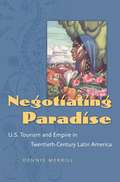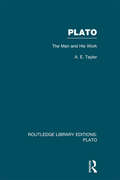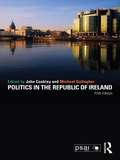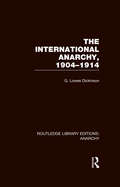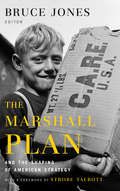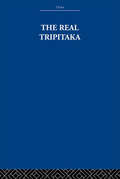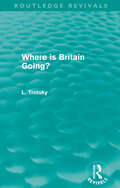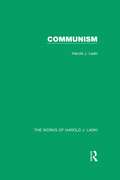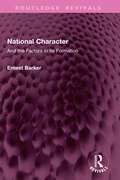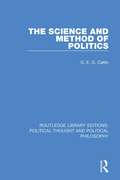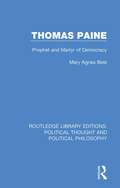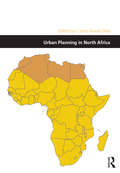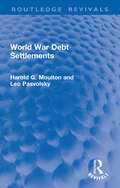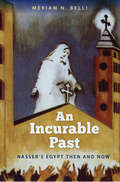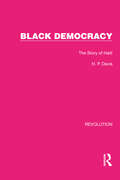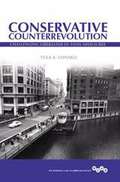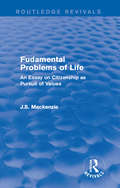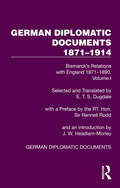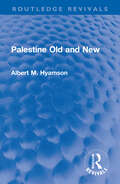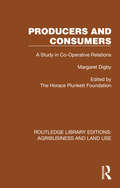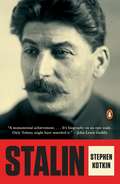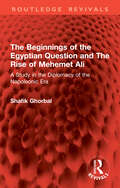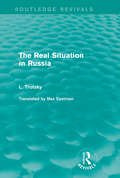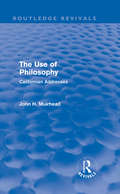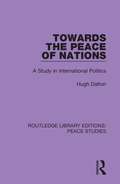- Table View
- List View
Negotiating Paradise
by Dennis MerrillAccounts of U.S. empire building in Latin America typically portray politically and economically powerful North Americans descending on their southerly neighbors to engage in lopsided negotiations. Dennis Merrill's comparative history of U.S. tourism in Latin America in the twentieth century demonstrates that empire is a more textured, variable, and interactive system of inequality and resistance than commonly assumed. In his examination of interwar Mexico, early Cold War Cuba, and Puerto Rico during the Alliance for Progress, Merrill demonstrates how tourists and the international travel industry facilitated the expansion of U.S. consumer and cultural power in Latin America. He also shows the many ways in which local service workers, labor unions, business interests, and host governments vied to manage the Yankee invasion. While national leaders negotiated treaties and military occupations, visitors and hosts navigated interracial encounters in bars and brothels, confronted clashing notions of gender and sexuality at beachside resorts, and negotiated national identities. Highlighting the everyday realities of U.S. empire in ways often overlooked, Merrill's analysis provides historical context for understanding the contemporary debate over the costs and benefits of globalization.
Plato: The Man And His Work (Routledge Library Editions: Plato)
by A.E. TaylorThis book provides an introduction to Plato’s work that gives a clear statement of what Plato has to say about the problems of thought and life. In particular, it tells the reader just what Plato says, and makes no attempt to force a system on the Platonic text or to trim Plato’s works to suit contemporary philosophical tastes. The author also gives an account that has historical fidelity - we cannot really understand the Republic or the Gorgias if we forget that the Athens of the conversations is meant to be the Athens of Nicias or Cleon, not the very different Athens of Plato’s own manhood. To understand Plato’s thought we must see it in the right historical perspective.
Politics in the Republic of Ireland
by Michael Gallagher John CoakleyPolitics in the Republic of Ireland is now available in a fully revised fifth edition. Building on the success of the previous four editions, it continues to provide an authoritative introduction to all aspects of politics in the Republic of Ireland. Written by some of the foremost experts on Irish politics, it explains, analyzes and interprets the background to Irish government and contemporary political processes. Bringing students up to date with the very latest developments, Coakley and Gallagher combine real substance with a highly readable style, providing an accessible textbook that meets the needs of all those who are interested in knowing how politics and government operate in Ireland.
The International Anarchy (Routledge Library Editions: Anarchy)
by G. Lowes DickinsonThis volume, a classic of its time, discusses the tragic evolution of European politics from 1870-1914. The main part of the book describes the development of the relations between France, Germany, Russia and Britain and follows the sequence of political events, the Triple Alliance and Bismarck's secret treaties, the Triple Entente, Morocco and the Conference of Algeciras, The Annexation of Bosnia, Agadir, Tripoli, the Bagdad Railway, Persia, the Far East, the Balkan Wars. Its value remains because while other books deal with the actions of individuals, this volume indicates the underlying forces of which they were the victims.
The Marshall Plan and the Shaping of American Strategy
by Strobe Talbott Bruce D. Jones Will MorelandHow the United States helped restore a Europe battered by World War II and created the foundation for the postwar international orderSeventy years ago, in the wake of World War II, the United States did something almost unprecedented in world history: It launched and paid for an economic aid plan to restore a continent reeling from war. The European Recovery Plan-better known as the Marshall Plan, after chief advocate Secretary of State George C. Marshall-was in part an act of charity but primarily an act of self-interest, intended to prevent postwar Western Europe from succumbing to communism. By speeding the recovery of Europe and establishing the basis for NATO and diplomatic alliances that endure to this day, it became one of the most successful U.S. government programs ever.The Brookings Institution played an important role in the adoption of the Marshall Plan. At the request of Arthur Vandenberg, chairman of the Senate Foreign Relations Committee, Brookings scholars analyzed the plan, including the specifics of how it could be implemented. Their report gave Vandenberg the information he needed to shepherd the plan through a Republican-dominated Congress in a presidential election year.In his foreword to this book, Brookings president Strobe Talbott reviews the global context in which the Truman administration pushed the Marshall Plan through Congress, as well as Brookings' role in that process. The book includes Marshall's landmark speech at Harvard University in June 1947 laying out the rationale for the European aid program, the full text of the report from Brookings analyzing the plan, and the lecture Marshall gave upon receiving the Nobel Peace Prize in 1953. The book concludes with an essay by Bruce Jones and Will Moreland that demonstrates how the Marshall Plan helped shape the entire postwar era and how today's leaders can learn from the plan's challenges and successes.
The Real Tripitaka: And Other Pieces
by Arthur Waley The Arthur EstateFirst published in 1952. The Real Tripitaka gives an account of the seventh century pilgrim's adventures, spiritual and material, both in India and after his return to China. In addition the book contains an account of a Japanese pilgrim's visit to China in the ninth century, which describes the Wu-t'ai Shan, China's great place of Pilgrimage, and an eye-witness's account of the great persecution of Buddhism in 842-845 A.D.
Where is Britain Going? (Routledge Revivals)
by Leon TrotskyFirst Published in 1926, Where is Britain Going? focuses on the historical factors and circumstances which were to define Britain’s development in the midst of social unrest at that time. The book considers the future of Britain in an age when the working classes were being driven into confrontation with the state under the impact of the world crisis of capitalism. Writing over eighty years ago, Trotsky concentrates on the decline of British imperialism in his analysis of the Bolshevik Revolution. In a brilliant polemic that exposes all the treachery of the Labour leaders in the year before the General strike, he recalls the revolutionary traditions of the working class and draws on the historical lessons of the English Civil War and Chartism. Rejecting the parliamentary road and stripping bare the pretensions of Fabian socialism, Where is Britain going? outlines perspectives of revolution which continue to retain their validity.
Communism (The Works of Harold J. Laski)
by Harold J. LaskiThis volume bases a clear and unbiased account of Communist philosophy on the Marxian Materialist Concept of History and Marxian Theory of Value. The spear-head of Marxism is its doctrine of class-struggle and from this Laski sets out on in his exposition of the Communist attitude. Although first published in 1927, the intervening years have in no way detracted from the intrinsic value of this enlightening study, regarded by many as the essential textbook for the understanding of this subject.
National Character: And the Factors in its Formation (Routledge Revivals)
by Ernest BarkerFirst published in 1927, National Character is based upon a course of ten lectures on citizenship, delivered, under the terms of the Stevenson Foundation, in the University and the City of Glasgow during the latter part of 1925 and the beginning of 1926. The author argues that to see how nations have become what they are may be the best way of discovering how they can make themselves other than what they are.Divided into two parts-the material factors and the spiritual factors, the book discusses themes like race, territory and climate, population and occupation, growth of national spirit, law and government, influence of churches, role of literature and thought, and ideas and system of education to understand the factors behind the formation of national character. This is an important historical reference work for scholars and researchers of political studies and political philosophy.
The Science and Method of Politics (Routledge Library Editions: Political Thought and Political Philosophy #12)
by G. E. CatlinOriginally published in 1927, this book was written as a reaction to the First World War, hoping to try and analyse the causes leading up to it. The author states in the Preface that he puts this forward as an unsystematic contribution to what he is conscious is a very great subject, and he adds since Aristotle, an almost untouched one. He starts by looking at the nature, methods and uses of history, considered from a political point of view. He goes on to look at the possibility of a political science; the place of politics among the social sciences, and the process of politics. In conclusion he considers the relation of politics and ethics.
Thomas Paine: Prophet and Martyr of Democracy (Routledge Library Editions: Political Thought and Political Philosophy #8)
by Mary Agnes BestFirst published in 1927. This study explores Thomas Paine, an English-born American philosopher, activist, political theorist and revolutionary. The author examines Paine’s important aspects of Paine’s life, including his migration to the British Colonies, his participation in the American Revolution, and his imprisonment in Paris. This title will be of great interest to historians and those studying philosophy and politics.
Urban Planning in North Africa (Design and the Built Environment)
by Carlos Nunes SilvaThere has been relatively little written on the history of urban planning in North Africa, despite the wealth of towns and cities in this region which date back to Antiquity. The book explores the history of urban planning in North Africa and the challenges confronting contemporary urban planning in Algeria, Egypt, Libya, Morocco, and Tunisia. It examines the transnational flow of planning ideas during the colonial period, namely through the French, British, and Italian colonial presence, and the Portuguese and Spanish influences as well, and discusses key challenges currently confronting urban planning in the major urban centers in the region. The fifteen chapters that constitute the book offer an informed analysis of the history of urban planning in North Africa, covering the pre-colonial, colonial and post-colonial periods.
World War Debt Settlements (Routledge Revivals)
by Leo Pasvolsky Harold G. MoultonWorld War I left in its wake an unparalleled amount of international debt. Within a period of 5 years a larger sum of international obligations existed than had been built up by ordinary processes during the whole of the preceding century. These debts were, moreover, inter-governmental in character and resulted almost wholly from the destructive processes of war. At the end of the war there was surprisingly little realization in the world of the all-pervasive and far-reaching political and economic implications of the war debts. Originally published in 1927, this book discusses the amount and origin of each of the debts; the nature of the various negotiated settlements; the changes in national policies which occurred and the issues which remained unresolved at the time of publication.
An Incurable Past: Nasser's Egypt Then and Now
by Mériam N. Belli"Spanning virtually the entire twentieth century and as timely as the outbreak of the 2011 ‘January Revolution,’ this work has much to say about where Egypt has been, who Egyptians are and, ultimately, where they may take their country." --Joel Gordon, author of Nasser: Hero of the Arab Nation "A truly extraordinary accomplishment that is thought provoking, creative, and inspiring. Belli is the first in Middle Eastern studies to examine the cultural history of twentieth-century Egypt through the interactions between education and remembrance. Her revised theoretical approach is applicable not only to Middle Eastern societies and cultures, but to others worldwide." --Israel Gershoni, Tel Aviv University "An interesting history of memory that is diverse, dynamic, and disparate. Makes an outstanding contribution to our understandings of Egyptian national identity and memory." --Nancy L. Stockdale, University of North Texas Examining history not as it was recorded, but as it is remembered, An Incurable Past contextualizes the classist and deeply disappointing post-Nasserist period that has inspired today’s Egyptian revolutionaries. Public performances, songs, stories, oral histories, and everyday speech reveal not just the history of mid-twentieth-century Egypt, but also the ways in which ordinary people experience and remember the past. Constructing a ground-breaking theoretical framework, Mériam Belli demonstrates the fragility of the "collectivity" and the urgent need to replace the current method for studying collective memory with a new approach she defines as "historical utterances." Contextual and relational, these links between intimate and public historical narratives are an integral part of a society’s dialogue about its past, present, and future. Three major vernacular expressions constitute the historical utterances that illuminate the Nasserite experience and its present. The first is universal schooling and education. The second is anti-colonial struggle, as exemplified by Port Said’s effigy burning festival. The third is the public’s responses to the "miraculous millenarian" apparition of the Virgin Mary. Using an extensive array of sources, ranging from official archives and press reportage to fiction, public rituals, and oral interviews, Belli’s findings penetrate issues of class, religion, and social and political activism. She shows that personal testimonies and public representations allow us a deep understanding of Egypt’s construction of the modern in its many sociocultural layers. Mériam N. Belli is associate professor of history at the University of Iowa.
Black Democracy: The Story of Haiti (Routledge Library Editions: Revolution #4)
by H.P. DavisThis book, first published in 1929, examines the history of Haiti and its long struggle for independence. The revolution against the French is treated in some detail, as is the story of the free Haitian republic that followed. Building a new country from slavery was no easy task, and another revolutionary period followed in the early twentieth century, which is also analysed alongside its aftermath.
Conservative Counterrevolution: Challenging Liberalism in 1950s Milwaukee
by Tula A ConnellIn the 1950s, Milwaukee's strong union movement and socialist mayor seemed to embody a dominant liberal consensus that sought to continue and expand the New Deal. Tula Connell explores how business interests and political conservatives arose to undo that consensus, and how the resulting clash both shaped a city and helped redefine postwar American politics. Connell focuses on Frank Zeidler, the city's socialist mayor. Zeidler's broad concept of the public interest at times defied even liberal expectations. At the same time, a resurgence of conservatism with roots presaging twentieth-century politics challenged his initiatives in public housing, integration, and other areas. As Connell shows, conservatives created an anti-progressive game plan that included a well-funded media and PR push; an anti-union assault essential to the larger project of delegitimizing any government action; opposition to civil rights; and support from a suburban silent majority. In the end, the campaign undermined notions of the common good essential to the New Deal order. It also sowed the seeds for grassroots conservatism's more extreme and far-reaching future success.
Fudamental Problems of Life: An Essay on Citizenship as Pursuit of Values (Routledge Revivals)
by J.S. MackenzieIn this volume, originally published in 1928, Mackenzie explores the meaning of Value and its place and relation in human thought and life. Divided into two parts, the first concerns itself with more general problems concerning Value while the latter part details the bearing Value has upon social problems. Mackenzie integrates the major branches of philosophy (Logic, Ethics, Metaphysics and Aesthetics) to analyse and evaluate the fundamental problems of citizenship making this title ideal for students of Philosophy and Politics.
German Diplomatic Documents 1871–1914 Volume 1: Bismarck’s Relations with England 1871–1890 (German Diplomatic Documents 1871–1914)
by Dugdale, E. T. S. Rennell Rodd Headlam-Morley, J. W.Originally published in English in 1928, this volume deals mainly with Anglo-German relations at the end of the 19th Century. Chancellor Otto von Bismarck’s voice can be heard clearly in the documents which give an extensive picture of the alternating phases of relations between Great Britain and Germany, as influenced by their respective obligations and interests in the international issues which united or divided the Powers over a period of twenty years. The strongest impression which these documents leave is the revelation of how greatly the mentality of the western world changed since they were drafted, and especially during the decade which came after World War I. The shaping of policy, as exhibited in these despatches and memoranda, is governed almost exclusively by the ultimate idea of war as the deciding factor. The menace of war and the prospects of success or failure in aggression or defence appear to be the essential motives of policy.
Palestine Old and New (Routledge Revivals)
by Albert M. HyamsonFirst published in 1928, Palestine Old and New is a historical travel guide providing a preliminary account of Palestine through the eye of a Zionist. The book takes the reader through the natural landscape of Palestine, familiarizing them with the local Muslim, Jewish and Christian populations, and providing both historical and Biblical accounts of various sites. As the chief immigration officer in British Mandate of Palestine from 1921 to 1934, the intended audience of the author was the Jews thinking about immigrating to Palestine, but his descriptive portrayal of the currently occupied territory is a rich account for present readers of the Palestine that was. The language used is a reflection of its era and no offence is meant by the Publishers to any reader by this republication. This book will be of interest to students of history, political science, international relations and geography.
Producers and Consumers: A Study in Co-Operative Relations (Routledge Library Editions: Agribusiness and Land Use #6)
by Margaret DigbyAlthough originally published in 1928, many of the issues discussed in this book remain pertinent today: in unstable markets grappling with labour shortages, how to pay the producers of food a fair price, at a price the consumer can afford, whilst maximising efficiency and minimising waste. Against this backdrop, the book discusses co-operative movements from the UK, Denmark, New Zealand, the former USSR and the USA.
Stalin: Paradoxes of Power, 1878-1928
by Stephen KotkinA magnificent new biography that revolutionizes our understanding of Stalin and his worldIt has the quality of myth: a poor cobbler&’s son, a seminarian from an oppressed outer province of the Russian empire, reinvents himself as a top leader in a band of revolutionary zealots. When the band seizes control of the country in the aftermath of total world war, the former seminarian ruthlessly dominates the new regime until he stands as absolute ruler of a vast and terrible state apparatus, with dominion over Eurasia. While still building his power base within the Bolshevik dictatorship, he embarks upon the greatest gamble of his political life and the largest program of social reengineering ever attempted: the collectivization of all agriculture and industry across one sixth of the earth. Millions will die, and many more millions will suffer, but the man will push through to the end against all resistance and doubts.Where did such power come from? In Stalin, Stephen Kotkin offers a biography that, at long last, is equal to this shrewd, sociopathic, charismatic dictator in all his dimensions. The character of Stalin emerges as both astute and blinkered, cynical and true believing, people oriented and vicious, canny enough to see through people but prone to nonsensical beliefs. We see a man inclined to despotism who could be utterly charming, a pragmatic ideologue, a leader who obsessed over slights yet was a precocious geostrategic thinker—unique among Bolsheviks—and yet who made egregious strategic blunders. Through it all, we see Stalin&’s unflinching persistence, his sheer force of will—perhaps the ultimate key to understanding his indelible mark on history.Stalin gives an intimate view of the Bolshevik regime&’s inner geography of power, bringing to the fore fresh materials from Soviet military intelligence and the secret police. Kotkin rejects the inherited wisdom about Stalin&’s psychological makeup, showing us instead how Stalin&’s near paranoia was fundamentally political, and closely tracks the Bolshevik revolution&’s structural paranoia, the predicament of a Communist regime in an overwhelmingly capitalist world, surrounded and penetrated by enemies. At the same time, Kotkin demonstrates the impossibility of understanding Stalin&’s momentous decisions outside of the context of the tragic history of imperial Russia.The product of a decade of intrepid research, Stalin is a landmark achievement, a work that recasts the way we think about the Soviet Union, revolution, dictatorship, the twentieth century, and indeed the art of history itself.Stalin: Waiting for Hitler, 1929-1941 will be published by Penguin Press in October 2017
The Beginnings of the Egyptian Question and The Rise of Mehemet Ali: A Study in the Diplomacy of the Napoleonic Era (Routledge Revivals)
by Shafik GhorbalHistorical research which throws light on the consequences of the Napoleonic invasion of Egypt set in motion forces in 1798 which were, the author argued when this book was originally published in 1928, still at work in the East and West. The book traces the diplomatic history of the events which led to the rise of Mehemet Ali, the founder of modern Egypt and was based on meticulous research of source material in British and French archives.
The Real Situation in Russia (Routledge Revivals Ser.)
by Leon TrotskyThe Real Situation in Russia, first published in 1928, contains three of Trotsky’s harshest rebuttals of Stalin’s takeover of the Russian Revolution following the death of Lenin. The first part contains a defence of the ‘Opposition Platform’ against the Stalinist denunciation; the second details Trotsky’s view of the precise nature of the Stalinist program, as well as its disastrous consequences for Russia; and the third demonstrates the unashamed falsification of the history by Stalin with regard to the beginning of the Revolution. Including a sympathetic, but nonetheless astute, introduction to Trotsky’s argument by the translator, The Real Situation in Russia will prove to be of value to all students of twentieth-century Marxism, and in particular to those interested in the Russian Revolution – not only its origins and early development, but also, perhaps, the reasons for its ultimate failure.
The Use of Philosophy: Californian Addresses (Routledge Revivals)
by John H MuirheadFirst published in 1928, this book reproduces the lectures and addresses that John Henry Muirhead gave on various occasions during the two and a half years he spent as Lecturer of Philosophy on the Mills Foundation at the University of California, USA. The different chapters look at the meaning and general place of Philosophy as a subject of study and the application of its leading conceptions to different areas of modern life, including science and politics. The final chapters however, present two short talks of a different nature, which were addressed to Scottish countrymen, gathered on foreign shores. This book outlines Muirhead's philosophical thoughts and conclusions to which he devoted his life.
Towards the Peace of Nations: A Study in International Politics (Routledge Library Editions: Peace Studies)
by Hugh DaltonHugh Dalton was a British Labour Party economist and politician, who served as Chancellor of the Exchequer from 1945 to 1947 under Clement Atlee. After surviving the First World War, he was drawn in to active politics with the belief that, rightly handled, it could put an end to war. This title, originally published in 1928, is based on his journeys of political observation in Europe, where he examined the new conditions created by the war and subsequent events. He outlines some central problems and some provisional solutions.
